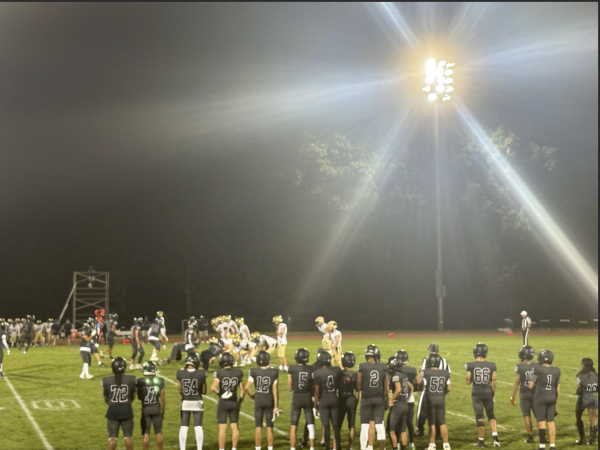Sports betting increases in popularity among students despite risk of addiction
In May of last year, the Supreme Court overturned a 1992 federal law that banned sports betting. The ruling did not legalize sports betting, but it did allow individual states to legalize it with their own specifications. Despite the fact that sports betting is illegal in most states, recent observations have shown a decline in strict enforcement of those laws. While only eight states currently have full-blown legal sports betting, and two, including New York, have recently passed bills to legalize it, sports media across the country have more openly incorporated gambling into their product. Perhaps unsurprisingly then, there seems to be a rise in casual betting and that includes among teenagers. Our reporting indicates a definite cohort of Hackley students who enjoy the practice, though exact numbers are hard to know.
It is not just the legal landscape that is encouraging sports betting. Fox Sports airs a sports talk show centered around sports betting called “Lock It In” every weekday at 4:30 p.m. Other mainstream sports outlets such as Bleacher Report and Fansided have also started to produce content surrounding sports betting, as both apps have channels for gambling advice. Even ESPN and CBS sports, two of the main services a casual fan would look to simply to see live scores or future events, feature Vegas betting lines next to all contests when available.
Despite the enthusiasm, dangers accompany the new prevalence of sports betting. For example, “Lock It In,” like other betting advice platforms, was intended to educate the average fan betting on sports. However, some argue it actually creates a false sense of confidence that the odds are in the bettors’ favor when in reality they are far from it. The fact of the matter is that in sports betting the public loses money on average. The public loses money through the ≈10% cut the house takes on every bet. Vegas bookmakers are incredibly savvy and create lines on games that are truly 50/50: when placing a bet, even if someone with experience claims it is a “good bet,” the outcome of the bet does still remain a toss-up. What this means, is eventually the laws of statistics will catch up to you and a 10% loss can be assumed over the long run. Because the cut is a factor of the bet itself, this fee is minimized by small bets and maximized by larger wagers. The fact of the matter is that financially the bettor is at a loss; however, when that loss is small, many Hackley students believe that the candy bar priced loss is worth the fun and camaraderie surrounding sports betting.
Despite the risks, some people, including Hackley students, argue that sports betting is overall worthwhile for the enjoyment it brings them. Beyond making money, the supposed fun of betting is said to come from making picks with friends, doing research, as well as talking about picks and sharing opinions with friends. Another positive, according to bettors, is that having money on the line can make games with no rooting interests fun and exciting.
Most Hackley students who do engage in the betting craze tend to lean more towards daily fantasy sports or DFS. DFS is similar to sports betting but instead of picking the outcome of a game you select individual players each night and their statistics are compiled into points accumulated throughout the night. DFS is inherently a low-risk game because most contest’s entry fees are under $10 and while host sites do still snatch a 10% cut, simply doing more research and spending more time with a lineup can move the odds closer and closer in a bettor’s favor.
A senior who asked to be kept anonymous very much enjoyed DFS but found himself starting to accumulate a lot of losses, and then decided to quit. When asked about his decision he said, “It was tough, I kept thinking I would win but when I finally realized how bad I was I just had to give it up.”
Some Hackley students do admit to having a problem with sports gambling. Another senior who also requested anonymity admitted that he is regarded by his friends as someone with a betting issue. “I have to learn more about the consequences of gambling,” he said, “but so far I have been winning so I have no reason to stop, but if I were losing money I think I would stop.”
Winning never lasts forever, but risk assessment and rationality are not abundant in the minds of gambling addicts. In fact, Ferris Jabr, writing in the Scientific American, cites a 2003 Yale University study and a 2012 University of Amsterdam study, both of which yielded results suggesting that gambling addicts “had unusually low levels of electrical activity in prefrontal brain regions that help people assess risks and suppress instincts” (Jabr). Such low electrical activity in the aforementioned region of the brain is also consistent in drug addicts (Jabr).
Whether someone is an “addict” or not is not a clear call, hence the challenge in knowing when a harmless pastime is shifting to a dangerous habit. While sports betting can be an enjoyable and safe activity for some, it is extremely dangerous to engage in such betting. In the United States alone, approximately 10 million people have a gambling addiction (North American Foundation for Gambling Addiction Help). Many are interested to see what happens when presumably even more states legalize the practice.





